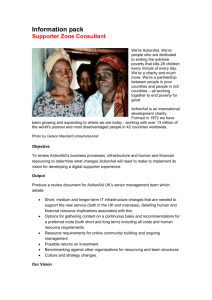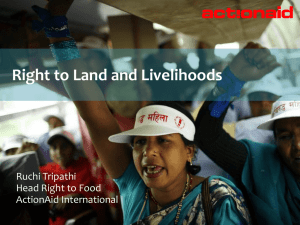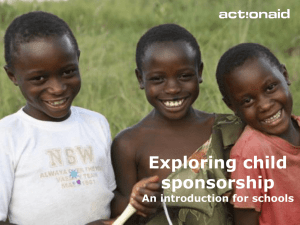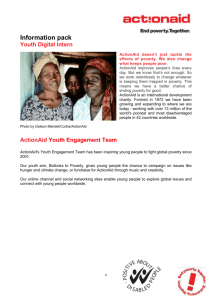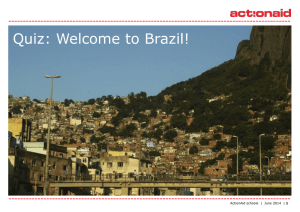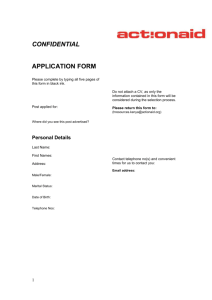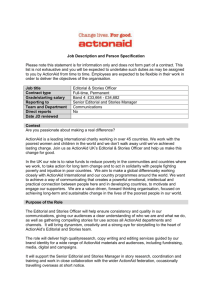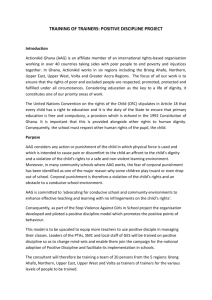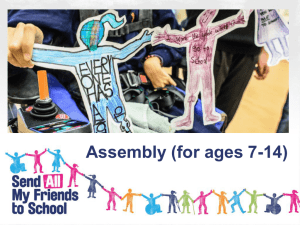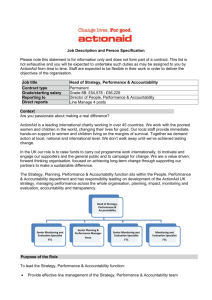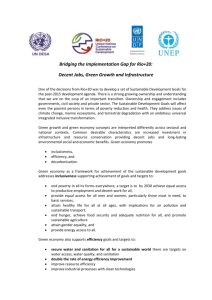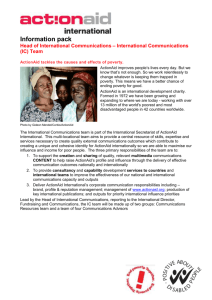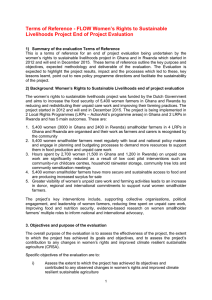tor_for_hiring_national_co
advertisement
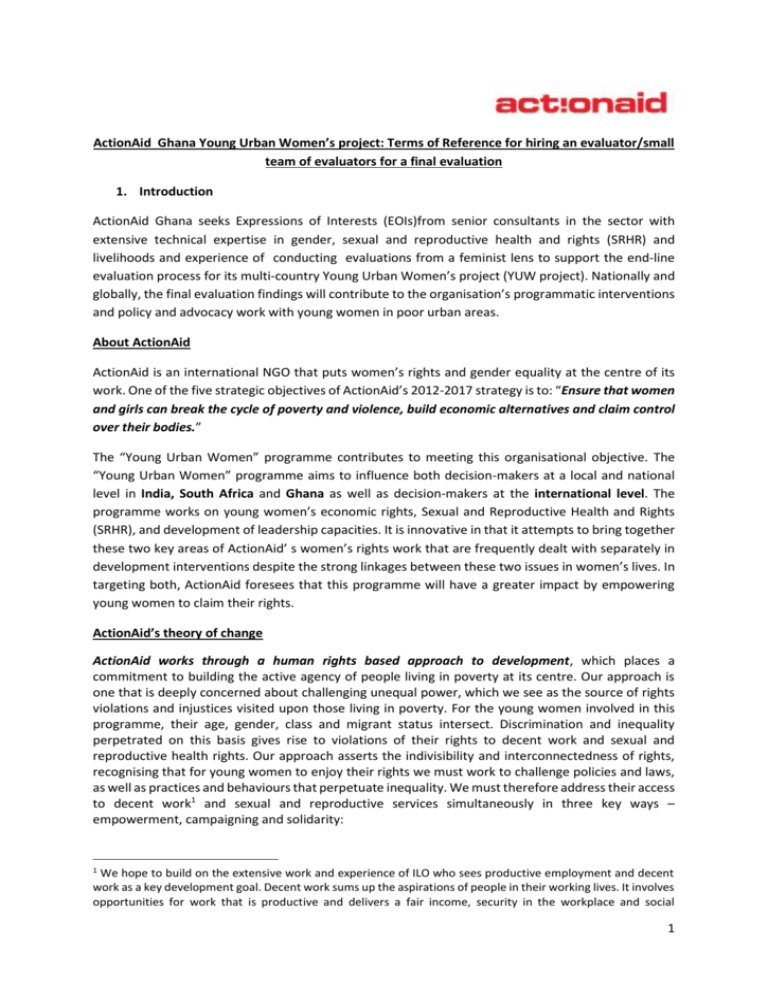
ActionAid Ghana Young Urban Women’s project: Terms of Reference for hiring an evaluator/small team of evaluators for a final evaluation 1. Introduction ActionAid Ghana seeks Expressions of Interests (EOIs)from senior consultants in the sector with extensive technical expertise in gender, sexual and reproductive health and rights (SRHR) and livelihoods and experience of conducting evaluations from a feminist lens to support the end-line evaluation process for its multi-country Young Urban Women’s project (YUW project). Nationally and globally, the final evaluation findings will contribute to the organisation’s programmatic interventions and policy and advocacy work with young women in poor urban areas. About ActionAid ActionAid is an international NGO that puts women’s rights and gender equality at the centre of its work. One of the five strategic objectives of ActionAid’s 2012-2017 strategy is to: “Ensure that women and girls can break the cycle of poverty and violence, build economic alternatives and claim control over their bodies.” The “Young Urban Women” programme contributes to meeting this organisational objective. The “Young Urban Women” programme aims to influence both decision-makers at a local and national level in India, South Africa and Ghana as well as decision-makers at the international level. The programme works on young women’s economic rights, Sexual and Reproductive Health and Rights (SRHR), and development of leadership capacities. It is innovative in that it attempts to bring together these two key areas of ActionAid’ s women’s rights work that are frequently dealt with separately in development interventions despite the strong linkages between these two issues in women’s lives. In targeting both, ActionAid foresees that this programme will have a greater impact by empowering young women to claim their rights. ActionAid’s theory of change ActionAid works through a human rights based approach to development, which places a commitment to building the active agency of people living in poverty at its centre. Our approach is one that is deeply concerned about challenging unequal power, which we see as the source of rights violations and injustices visited upon those living in poverty. For the young women involved in this programme, their age, gender, class and migrant status intersect. Discrimination and inequality perpetrated on this basis gives rise to violations of their rights to decent work and sexual and reproductive health rights. Our approach asserts the indivisibility and interconnectedness of rights, recognising that for young women to enjoy their rights we must work to challenge policies and laws, as well as practices and behaviours that perpetuate inequality. We must therefore address their access to decent work1 and sexual and reproductive services simultaneously in three key ways – empowerment, campaigning and solidarity: 1 We hope to build on the extensive work and experience of ILO who sees productive employment and decent work as a key development goal. Decent work sums up the aspirations of people in their working lives. It involves opportunities for work that is productive and delivers a fair income, security in the workplace and social 1 Empowerment = the process through which we enable young women living in poverty to become rights activists. We do this by making them more aware and more critical of power relations and by strengthening their own power. Campaigning = harnessing young women’s power through organisation, mobilisation and communication around a simple and powerful demand, to achieve a measurable political or social change. Solidarity = the process of uniting allies in a politically supportive relationship that may cross geographies or “areas” of struggle to support and strengthen young women’s movements for change. 2. Project background and overview:The Young Urban Women programme is a multi-country programme that is currently being implemented in seven poor urban and peri-urban areas across India, South Africa and Ghana (Tamale and Accra). These cities were carefully selected because of their large young urban poor populations, high levels of poverty and inequality and the presence of strong ActionAid partners in the ground. Over all Programme goal: Our goal is that in 3 years, 5,800 young urban women living in poverty in India, Ghana and South Africa will have greater dignity through more economic independence and control over their bodies, and their voices will be heard and recognised in international forums. In Ghana, we aim at 2,000 young urban women living in poverty to have greater dignity through more economic independence and control over their bodies, and their voices will be heard and recognised in national and international forums. Expected outcomes: Outcome 1: Young women have safe and decent work and livelihoods, and can exercise greater control over their income Outcome 2: Young women's informed choices about their sexual and reproductive health are increasingly realised Outcome 3: Young women in the areas we programme in are empowered and supported by allies and responsible stakeholders to effect change in their own lives, their families, their communities and different levels of government Target group and indirect beneficiaries: The project works with 2,000 young women in Ghana. Across the programme, there are a total of 5,800 young women. The project will be finishing in December, 2015 and in June, 2016 in India and South Africa. The project has a result framework with quantitative indicators of change, and has also developed a plethora of participatory monitoring tools to gather qualitative information. The project conducted a simple baseline in 2014 and a mid-term review in 2015. Now an end-line evaluation will need to be conducted in December, 2015 in Ghana. 3. Aim of the evaluation protection for families, better prospects for personal development and social integration, freedom for people to express their concerns, organize and participate in the decisions that affect their lives and equality of opportunity and treatment for all women and men. 2 The aim of this assignment is to conduct the end-line evaluation process over a period of three months (including field-testing, finalisation and implementation of the evaluation). Evaluation objectives The overall objective of the final evaluation is to assess to what extent the programme has achieved the changes that were sought, for instance, how and to what extent the project contributed to changes in power relationships in favour of the rights of young urban women within the family, community and wider civil society, and what other, perhaps unintended outcomes the project has contributed to. The evaluation will also explore how sustainable some of the outcomes are. As the project has piloted a new programmatic approach at ActionAid to combining work on themes of decent work, sexual and reproductive health and rights and building young women’s leadership, a key component of the evaluation is to ‘test’ the project’s ‘theory of change’, reflecting on whether the changes sought materialised in the ways that were expected, what the combination of thematic approaches added to the project, which were the most effective, and what the challenges were. The specific objectives of the evaluation are to: 1) 2) 3) 4) 5) Assess the extent to which the project has achieved its objectives and contributed to any observed changes in young urban women’s enjoyment of rights in terms of access to decent work, SRHR, unpaid care work, feminist leadership and advocacy skills in relation to the Results Framework; Identify other, and unintended (including negative) outcomes as a result of the programme interventions; Assess the relative effectiveness and challenges of different intervention strategies; (testing TOC and the integrated programming model) Assess the ways in which the project was implemented, particularly with regards to: a. The extent to which young women were placed at the centre of project. b. The extent to which the project was implemented in line with ActionAid’s Human Rights Based Approach (HRBA) Principles (particularly with regards to women’s rights, accountability to people living in poverty, and power dynamics); and c. To what extent resources were used efficiently to deliver the planned activities, outputs and outcomes. d. Identify three case studies from each country which highlight the best practices from the project. Make specific, actionable recommendations for sustaining, up-scaling and replicating project results and approaches in the project countries and more widely in the Federation. 4. Proposed methodology The International Consultant will develop the tools and methodologies on the lines described below. Under the guidance of the over-all International Consultant and in consultation with the ActionAid country and regional teams, the identified consultant at the national level will be expected to conduct 3 field testing and finalise the following proposed methodologies for the evaluation. In addition, she will be expected to lead the evaluation process. We will expect the national consultant to select and work with a team of young women data collectors, to train them on the following methodology and the tools, over-see and ensure over-all quality of the data collected. She will also be expected to develop the final national level evaluation report. Retrospective survey with YUW The retrospective survey will consult a sample of young women to explore how their knowledge, attitudes, behaviour, opportunities and access to services have changed during the course of the programme. The survey will be interviewer-administered, with a questionnaire covering themes of the key project indicators, adapted from the baseline/intake survey. Focus group discussions using participatory tools Participatory tools will be used to probe on issues arising from the survey with a selection of young women, for instance to evaluate the extent to understand if and how power equations have shifted in favour of the young women, and also to understand how the young women have understood oppressive gender norms, and staked claims over their own bodily integrity, have voiced their opinions and demonstrated leadership capacities. Interviews with project and external stakeholders In order to triangulate/corroborate the change women have identified in themselves, we will also speak to a select number of people who come into contact with them, such as their family and community members, where appropriate. In order to explore views of partners implementing the project on the approaches used, their effectiveness and challenges, semi-structured interviews with project staff and other stakeholders will be conducted. The national consultant is expected to interview a select number of external stakeholders, such as local government representatives, other CSOs with whom the partners have built solidarity and employers in order to understand how the programme may have contributed to changing views, the agenda, policies and practices around decent work and SHRH. Analysis and validation The national consultant will be expected to analyse the data coming out of Accra and Tamale and develop a national evaluation report. At the national level the evaluation findings will be shared and validated with the young women and community members and partners to enable them to reflect on the journey they have undertaken from the beginning of the programme to its closure. For this purpose a national level validation workshop will be organised. The national consultant is expected to support the AA country offices to support the workshop facilitation. This will be followed by an international final evaluation workshop to be organised in India in June 2016. 4 Evaluator tasks Using a feminist approach to monitoring and evaluation, the consultant/organisation will be required to undertake the following: Review the national and global baseline a n d M i d - t e r m r e v i e w reports and any other M&E related documentation including the existing participatory monitoring tools and intake forms. Finalise the end-line survey tools in consultation with AA country office and ActionAid International Secretariat. In consultation with ActionAid International and A A country team finalise participatory tools to be used in the end-line assessment for qualitative data gathering. Conduct trainings of data collectors. Ensure data analysis and high quality of data collection by being present during data collection process and provide continuous technical and monitoring support to data collectors. Ensure that a common coding system is developed and used across the different cities to enable analysis of qualitative data in a quantitative manner. Write the final national evaluation report based on the country reports. Facilitate the national end-line evaluation workshop. 5. Time-frame Consultation and methodology finalisation National level end-line survey data collection and national level report finalisation National evaluation workshop Final national evaluation report December, 2015- January, 2016 January,2016 February, 2016 February, 2016 The consultant will need to provide a total of 30 days of support to the project starting from December 2016 to February 2016, with the final national evaluation report expected by the 19th of February 2016. Consultant/agency specifications:- Extensive experience in conducting multi-country evaluations using quantitative and qualitative approaches. Good knowledge and experience of designing surveys and sampling methodologies. Proven experience in participatory approaches to designing monitoring and evaluation processes. Extensive experience of developing monitoring and evaluation (MEL) systems and evaluation design from a feminist lens. Extensive experience of M&E work on women’s rights with some experiences on Decent Work and SRHR. Extensive technical expertise on gender, particularly on young women. Proven cross-regional/global experience would be preferable. Excellent facilitation skills. 5 6. Application procedure:Please share the following documents as part of the application procedure:A proposal of not more than 3 pages (excluding annexes and CVs), elaborating how you meet the above criteria, including: A brief proposal of the methodology; Updated CVs; A tentative budget; and Examples of similar previous evaluations, including any feminist M&E work undertaken. Email: Henrietta.Lamptey@actionaid.org; Muazu.Ibrahim@actionaid.org Deadline: 14th December, 2015 6
